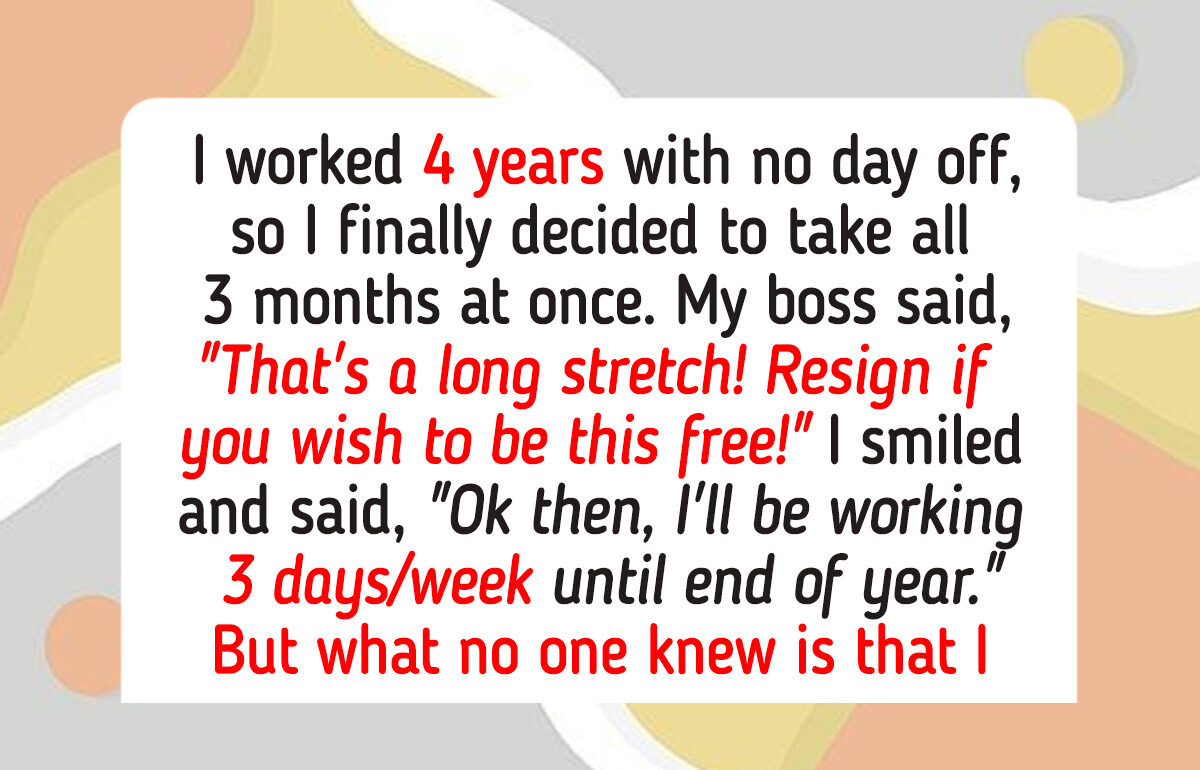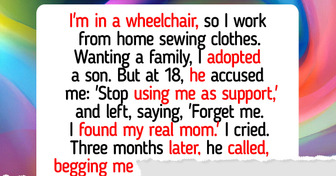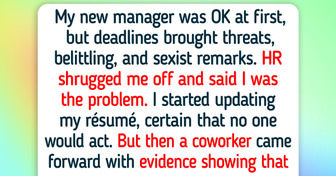... If my employer didn't give me a day off after 5 days, I'm outta there. Working for 4 years without a day off, cannot be real. I hope you meant 'Vacation Days' because that's just whack. You've been walked all over and you have done NOTHING about it.
I Was Denied My Days Off, So I Turned the Tables on HR

Many people work tirelessly for years, dreaming of finally taking a well-deserved break. But sometimes, when employees ask for the time off they’ve earned, they’re met with resistance or unfair rules instead of appreciation. Workplace power struggles over vacation time can reveal just how much companies value control over balance. Recently, one of our readers shared a letter about facing this very situation with her HR department.
The letter:
Dear Bright Side,
I worked for 4 years with no days off, so I finally decided to take all 3 months at once to go stay with family in Atlanta.
My boss looked at me and said, “That’s a long stretch! Resign if you wish to be this free!”
Then he added, “You work here, and you can’t just disappear for three months during our busiest season!”
I replied, “In that case, I’ll work 3 days a week until the end of the year.” He smirked.
A few hours later, HR made an announcement that shocked everyone. From now on, there would be a fixed list of dates each year when employees could request their time off — only during less busy periods.
Outside of those dates, everyone had to be at work, or there would be financial penalties. Soon after, we all received the list by email.
My colleagues started to complain, saying they should be free to choose their time off and that the list was restricting their rights. I kept quiet and just smiled.
But what no one knew is that I had already started sending my CV to companies. I’ll be using my approved days off to look for a new job.
And once I’ve used all my vacation days at the end of the year, I’ll resign — right in the middle of the company’s busiest time. Maybe then they’ll understand how unfair their rules are.
Am I overreacting by deciding to leave over this after years in this company?
Or is it normal for a company to dictate when employees can take their time off?
Best regards,
Shirley

Thank you, Shirley, for sharing your story with us. Your situation highlights a real struggle many employees face when companies restrict personal time under the guise of productivity.
We can understand how frustrating this must feel after years of dedication. Here are a few pieces of advice that might help you decide your next step.
Negotiate a compromise that benefits both sides.

Im glad this site is called Bright Side bc all they write is BS in return. If I get 3 months vacation I'm taking 3 months vacation.
Before walking away, see if you can turn this conflict into an opportunity for flexibility.
Action: Offer to shorten your 3-month leave but propose working remotely part of the time during your trip — for example, checking in weekly or taking on small projects from afar.
Why it matters: It shows initiative and professionalism while keeping your personal plan alive. Even if they refuse, you’ll leave knowing you handled things maturely — and with a stronger case if you decide to quit later.
Learn what this policy really reveals about management.

Your "compromise" suggestion is for him to work DURING his vacation?
Then why even bother taking the time off?
The vacation list isn’t just about timing — it’s about control.
Action: Observe how other departments react. Does HR listen to feedback? Does your boss apply the same rule to himself? If not, document everything — unfair practices, favoritism, workload stress.
Why it matters: These notes become valuable if you decide to file a complaint, negotiate severance, or speak openly about company culture in your next job interview.
Turn your “revenge plan” into a power move.

A lot of companies require that accrued vacation time be used by the end of the year, which is better for both parties. To not take PTO for 4 years is insane. You need to take it for your mental health. And no company can allow an employee take of 3 months straight. That's just ridiculous to even expect them to allow it.
Your instinct to leave is valid — but instead of resigning in anger, turn it into strategy.
Action: Quietly line up interviews, but aim to secure an offer before announcing your resignation. Time your departure to benefit you, not just to punish them.
Why it matters: Leaving mid—busy season may feel satisfying, but leaving on your own terms with another job waiting shows true control and professionalism.
Reframe your exit as a reward, not a punishment.

I couldn't disagree with your last statement more. I don't disagree that you should do it gracefully but I do not think you should say you want a healthier work-life balance that is a red flag to me and I will tell you why. Now remember I used to run a federal employee union for the department of Labor which was over 10,000 people in the bargaining unit in the national office. These days people saying they want to work life balance means they don't care about their job they just want to collect the paycheck and while I am a big believer in you work for money you don't go and be obvious about it. You do have a responsibility to be professional in doing your job and focus on your job and learning your craft and yes life is work and value comes from having a job. However this individual wanted to take 3 months off at once and I do not think that is reasonable for many reasons. I don't know what the specific role was but let's say it's a professional position as a data analyst. That is essentially what I did in addition to systems design and development and monitoring the employment database for the nation for the bureau of Labor statistics. If I were to take 3 months off the two regions that I was responsible for as part of my basic job role and I had a lot more responsibilities would have to be passed off on to other staff. In addition the system's monitoring and the deliverable monitoring of the quarterly unemployment reports for the nation which was my responsibility would have to be passed off as well. I did a significant amount of work towards the end of my tenure at BLS much to the point where I was free to pretty much make my own hours and that's a long story. So taking a month off would be hard but doable taking 3 months off would put a significant burden on the remainder of the staff. So this employee needs to understand that time off of that magnitude might benefit the employee but it would hurt the business the business is not in the the existence for allowing the employee to live a beautiful life but for doing whatever there economic function is. The bottom line comes down to they need to meet their operational goals. I would also put it back on the employee for not taking time off over 4 years. BLS had a lot of jerks for managers when I work there and I could tell you stories that would make your jaws drop not only it be a less but for the department of Labor and other federal agencies but one thing the managers never interfered with with employees any employees, even ones they pigeonholed was allowing them to take time off. Now there were some managers that would let employees say take a week off or 10 days and then 4:44 p.m. the day before they were scheduled to leave would say no we need you in the office. Under the fpm rules i, this is 100% permitted. As long as they come to the employee before 4:45 the day before this is actually written into the federal personnel regulations. I did have that happen twice in my 15-year career doing my job on the 202 program which is now the cew program while I was running the Union. HR got involved but their hands were tied because the manager was within their rights but the arbitrator found that the decision was arbitrary no pun intended and reinstated both employees with back pay. The point I'm making is you went 4 years without taking time off that's on you. You can't say I've earned my rest and respect when you didn't respect yourself for 4 years. So as a employee representative I would tell you both you and management are in the wrong and management is in the wrong for not making you take any time off over those four years
You’ve worked nonstop for 4 years — you’ve earned rest and respect.
Action: When you resign, do it gracefully. Thank them for the experience, mention your desire for a healthier work-life balance, and leave with your head high.
Why it matters: It preserves your professional reputation and closes the door on your terms — not theirs. Sometimes the real statement isn’t slamming the door; it’s walking out quietly while they still think they’re in charge.
It takes real courage to stand up for what’s right and to show kindness even when it’s not easy. Often, the kindest people are also the strongest — they choose compassion over comfort. These stories are a beautiful reminder of that strength.
Comments
First, when you say you haven't taken a day off in 4 years, I assume you mean Paid Time Off and not normal days off, because working every single day for four years straight would be illegal just about everywhere. Second, make sure you thoroughly understand your company's PTO policy before you enact this plan. Companies are allowed to enact blackout periods when PTO can't be used based on business needs, and they can also put in restrictions on how much PTO can be accumulated or used at one time. Your boss may be a jerk, but don't get yourself fired or end up losing all of your accumulated PTO just to prove a point because you took too much time off.
If they aren't going to give you the time off you can ask to at least get paid for the time off that is owed to you for 4
years.
Why would anyone give you 3 months off?!! It's your problem if you havent taken any of your leave till now ma'am!
Help your co-workers look for jobs so you may all quit and leave HR at their wits end 😜
3 months is a lot. It's not HR's problem if you couldn't divide your off days normally
Related Reads
15 Animal Stories That Prove Kindness Is a Language Every Living Being Speaks

I Adopted a Son—Then His Biological Family Shattered Our World

I Walked Out of the Family Reunion After My Stepdaughter Handed Me a List of “Rules”

I Tried Reporting My Toxic Boss, but HR’s Policy Made Me Regret It

15 Moments That Show Kindness Is Quiet but Changes Everything

16 Moments That Remind Us to Stay Kind Even If the World Turns Ice Cold

I Refuse to Forgive My Wife for What She Did to My Son

20 Stories That Remind Us to Stay Kind Even When Life Stops Playing Fair

I Funded My Wife’s Luxury Demands—She Made Me Regret Every Penny

I Refuse to Help My Pregnant Sister, and I Don’t Feel Guilty

14 Times Reality Proved to Be a Better Screenwriter Than Hollywood Could Ever Be

I Refused to Let My Toxic MIL Move In—Now My Husband’s Family Says I’m Ruining Their Lives
